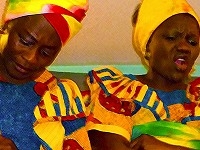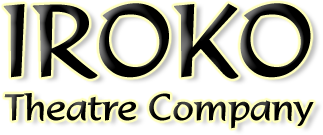
IYE AJA (Umbilical Cord)
A Heritage Lottery Funded Project
IYE AJA means Umbilical Cord in the Itsekiri language of Nigeria. This project, funded by Heritage Lottery Fund, aims to highlight and celebrate the ingenuity of Diaspora Africans in managing to retain an active commitment to their customs and values.
"Any culture that does not respond to change, that does not grow, will die."
IROKO Interviewee, Dr. Osita Okagbue
What is IYE AJA?
"IYE AJA" means "Umbilical Cord" in the Itsekiri language of Nigeria. This project, funded by Heritage Lottery Fund, aims to highlight and celebrate the ingenuity of Diaspora Africans in managing to retain an active commitment to many customs and values of their forbears whilst also adapting them to suit living in the UK.
The Need For The Project
The project was designed as a response to IROKO’s consultation with some African families. The consultation revealed that people find ways to find comfort in their lives in England, especially through adapting aspects of their customs and traditions.
Through our consultations we understood that the meaning behind many of the African cultural practices here in the UK have been diluted over generations. Although members of the older generations were leading their families in the customs and traditions of their forebears, some of them were unable to explain the full meaning of what they were doing and why they were doing it to other members of the family and others present.
Project Location
London Boroughs of Havering, Newham and Redbridge.
Output
- RESEARCH into the customs and traditions of various African countries;
- ORAL INTERVIEWS of first, second and third generation Africans living in London;
- CREATIVE PROCESS involves collating and analysing information from oral interviews, music composition and writing and devising dramatic pieces for re-enactment in showcases;
- SHOWCASE PERFORMANCES and exhibitions showing how various African customs and traditions have been modified to suit living in the UK.
- ORGANISED VISITS to the British Museum for local residents and volunteers;
- EXHIBITIONS in 5 libraries in the LB of Havering and Redbridge to widen access and participation;
- WORKSHOPS IN SCHOOLS to engage with younger audiences and their parents;
- PRODUCTION OF IYE AJA DVD and Factsheets for participants and participating organisations;
- DIGITAL UPLOAD of downloadable online resources e.g. music and audio clips.
Number Of People Reached
Approximately 8,295 people participated in discovering and sharing of African heritage – 398 attended school workshops and showcases; 56 attended the guided museum tours; 107 attended the showcases and exhibitions and approximately 7,734 people saw the exhibitions in 5 libraries over 6 weeks period.
Number Of People Interviewed
21 people ranging from first, second to third generation Africans shared their heritage with us through oral interviews conducted by our volunteers and researchers.
Project Partners
Research and Curatorial (Content, Volunteers, Artefacts, Public exhibition)
- The British Museum
- School of Oriental & African Studies (SOAS)
- University College London (UCL)
Learning and Outreach (Workshops, Exhibitions and Young People Engagement)
- Redden Court School
- Forest Gate Community School
- Romford Central Library
- Hornchurch Library
- Rainham Library
- Gants Hill Library
- Goodmayes Library
Community Resources (Engaging local audiences; Performances and Exhibitions)
- Newham African Caribbean Resource Centre, Newham
- Cardinal Heenan Centre, Redbridge
- Redbridge Libraries, Redbridge
Business Support (Providing support and guidance)
- CLR Consultant
- Community Development Institutes
- Raise-Up
- Newham Volunteers
Branding and Media (Communication strategy)
- Big Bang Lab
- Black Poppy
Feedback
“The guided tour brought the artefacts to life and I was transported back in time”. (Imelda)
“The fact that there was somebody who led us through and explain the significance of the artefact was very good” (Ms Adjei)
“Really interesting to have the personal aspect and insight – a wonderful experience.” (Ms Boorn)
“I enjoyed the history of the origin of each symbols, sculpture, ornaments and materials”. (Paizah)
“You inspired the students to create work of such a high standard whilst also teaching them African culture and heritage. Not only does your work develop their creative capabilities, it also helps them to further develop their cultural understanding and appreciation.” (Gemma Lord, Head of Drama, Redden Court School)
“I greatly enjoyed the experience of acting and dancing and it was fascinating to learn more about African traditions.” (Catarina, Year 8 student)
“It was exciting to play real, hand-carved African drums such as the djembes and kpanlogo”. (Clement, Year 8)
“It’s very important for people to know who they are. If you don’t know who you are, how can you explain that? …But if you know who you are and you pass that to your children, and they pass it to their children, then that makes us a strong community and strong people, knowing who we are”. IROKO Interviewee, Aisha Kaweesi,Ugandan
“The younger generation need to understand themselves better and this can be done only if they understand the culture in which they originated from. This gives them a sense of belonging, self-knowledge and self worth when faced with discrimination in their adopted land. Knowing the culture of their background helps them to better appreciate who they are vis-à-vis the western culture they live”. Pauline Kaburuk, Online Respondent
Did You Know ...
- ... that amongst some African communities, the burying of the umbilical cord (Iye Aja) under a tree symbolises growth, strength and prosperity for the newborn?
- ... that amongst the Neur people of southern Sudan the groom must pay 20-40 cattle and that the marriage is completed only after the wife has born 2 children?
- ... that if a husband dies then the husbands family must provide a brother to the widow and any children born to the brother are considered the deceased's children?
- ... that there are over 600 varieties of yams and 95% of these crops are grown in Africa. Compared to sweet potatoes, yams are starchier and drier?
Useful Websites and Resources
Here are some useful websites and resources that we have discovered during the course of this project:
Contact us now for bookings and more information.
Contact Us Now
For bookings and more information contact us now
Proverb of the month
"The horns cannot be too heavy for the head of the cow that must carry them."
Project Documents
- Alligator Pepper
- Burying The Dead
- Burial Ceremonies
- Burial Mask
- Colanut
- Cowrie Shell
- Culture and Growth
- Fattening Room
- Fertility Doll
- Herbal Medicine
- Himba Bridal Headdress
- Honey
- Knowing Your Heritage
- Marriage 1
- Marriage 2
- Mules As Limousine
- Naming Ceremony
- Ndebele Marriage Blanket
- Twins (Ibeji)
- Umbilical Cord
- Water
- Yam Festival
- Mother Tongue Full Score
Other Projects
Speaking without Voice
A project which explored four Nigerian pre-colonial nonverbal communication systems: Aroko, Nsibidi, Uli and the Talking Drums, made possible by money raised by National Lottery players awarded by the National Lottery Heritage Fund (NLHF).
Forever Young
Enhancing skills and wellbeing of older people through fun and gentle creative arts activities
Rhythmic Connections
Promoting social action and/volunteering through inter-generational encounter that enhances mental well-being
Stepping Stones Project
A project that used fun and creative means to enhance the practical English speaking skills of refugees/new migrants in Newham London, was funded by People’s Postcode Trust, a grant-giving charity funded entirely by players of People’s Postcode Lottery.
The Magic of Rhythms
A project supporting homeless and vulnerably housed people in the London Borough of Newham, using creative arts activities.
Friendly Circle
A family bonding project supported through funding from People’s Health Trust using money raised by HealthLives through The Health Lottery.
Our Shared Heritage (OSH)
Connecting cultures through stories, objects and artefacts
Bright Stars Project
Supported through funding from Aspers Good Causes Fund, provides opportunities for the development of skills of London Borough of Newham young people and their parents.
Royal Docks Stories
Encouraging discovery and sharing of oral stories!
'The Royal Docks Stories’ funded by The Royal Docks Trust, aims to uncover interesting people, stories and experiences about the Royal Docks area.
Homage to Canning Town African Ancestors
Discovering the history and contributions of Africans in and around Canning Town since the 1920's.
The Homage to Canning Town African Ancestors project explored the areas in and around Canning Town that have historical links with Africa.
IROKO Family Edutainment
Fun and Education For All The Family
Since 2009 Big Lottery has funded IROKO Family Edutainment project under its Family Learning Programme.
The Forgotten Folks Project
The Forgotten Folks project was funded by Comic Relief. It incorporated fun workshops that used elements of African arts and culture to break down the social isolation and health problems usually faced by elderly people.
Heritage Africana
A Heritage Lottery Funded Project
A project to explore the Oral history behind the artefacts in the British Museum's Sainsbury's African Gallery.













